新编大学英语第二版第三册第一单元Unit One Personality
新编大学英语3完整版课文翻译
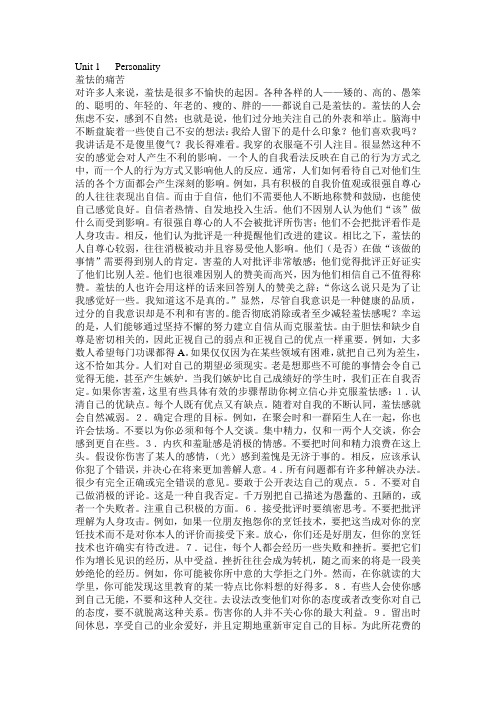
Unit 1 Personality羞怯的痛苦对许多人来说,羞怯是很多不愉快的起因。
各种各样的人——矮的、高的、愚笨的、聪明的、年轻的、年老的、瘦的、胖的——都说自己是羞怯的。
羞怯的人会焦虑不安,感到不自然;也就是说,他们过分地关注自己的外表和举止。
脑海中不断盘旋着一些使自己不安的想法:我给人留下的是什么印象?他们喜欢我吗?我讲话是不是傻里傻气?我长得难看。
我穿的衣服毫不引人注目。
很显然这种不安的感觉会对人产生不利的影响。
一个人的自我看法反映在自己的行为方式之中,而一个人的行为方式又影响他人的反应。
通常,人们如何看待自己对他们生活的各个方面都会产生深刻的影响。
例如,具有积极的自我价值观或很强自尊心的人往往表现出自信。
而由于自信,他们不需要他人不断地称赞和鼓励,也能使自己感觉良好。
自信者热情、自发地投入生活。
他们不因别人认为他们“该”做什么而受到影响。
有很强自尊心的人不会被批评所伤害;他们不会把批评看作是人身攻击。
相反,他们认为批评是一种提醒他们改进的建议。
相比之下,羞怯的人自尊心较弱,往往消极被动并且容易受他人影响。
他们(是否)在做“该做的事情”需要得到别人的肯定。
害羞的人对批评非常敏感;他们觉得批评正好证实了他们比别人差。
他们也很难因别人的赞美而高兴,因为他们相信自己不值得称赞。
羞怯的人也许会用这样的话来回答别人的赞美之辞:“你这么说只是为了让我感觉好一些。
我知道这不是真的。
”显然,尽管自我意识是一种健康的品质,过分的自我意识却是不利和有害的。
能否彻底消除或者至少减轻羞怯感呢?幸运的是,人们能够通过坚持不懈的努力建立自信从而克服羞怯。
由于胆怯和缺少自尊是密切相关的,因此正视自己的弱点和正视自己的优点一样重要。
例如,大多数人希望每门功课都得A。
如果仅仅因为在某些领域有困难,就把自己列为差生,这不恰如其分。
人们对自己的期望必须现实。
老是想那些不可能的事情会令自己觉得无能,甚至产生嫉妒。
当我们嫉妒比自己成绩好的学生时,我们正在自我否定。
新编大学英语综合教程3课文翻译
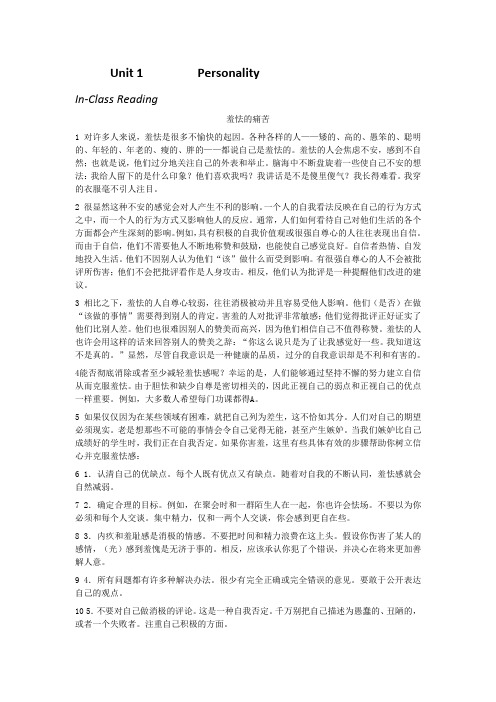
Unit 1 PersonalityIn-Class Reading羞怯的痛苦1 对许多人来说,羞怯是很多不愉快的起因。
各种各样的人——矮的、高的、愚笨的、聪明的、年轻的、年老的、瘦的、胖的——都说自己是羞怯的。
羞怯的人会焦虑不安,感到不自然;也就是说,他们过分地关注自己的外表和举止。
脑海中不断盘旋着一些使自己不安的想法:我给人留下的是什么印象?他们喜欢我吗?我讲话是不是傻里傻气?我长得难看。
我穿的衣服毫不引人注目。
2 很显然这种不安的感觉会对人产生不利的影响。
一个人的自我看法反映在自己的行为方式之中,而一个人的行为方式又影响他人的反应。
通常,人们如何看待自己对他们生活的各个方面都会产生深刻的影响。
例如,具有积极的自我价值观或很强自尊心的人往往表现出自信。
而由于自信,他们不需要他人不断地称赞和鼓励,也能使自己感觉良好。
自信者热情、自发地投入生活。
他们不因别人认为他们“该”做什么而受到影响。
有很强自尊心的人不会被批评所伤害;他们不会把批评看作是人身攻击。
相反,他们认为批评是一种提醒他们改进的建议。
3 相比之下,羞怯的人自尊心较弱,往往消极被动并且容易受他人影响。
他们(是否)在做“该做的事情”需要得到别人的肯定。
害羞的人对批评非常敏感;他们觉得批评正好证实了他们比别人差。
他们也很难因别人的赞美而高兴,因为他们相信自己不值得称赞。
羞怯的人也许会用这样的话来回答别人的赞美之辞:“你这么说只是为了让我感觉好一些。
我知道这不是真的。
”显然,尽管自我意识是一种健康的品质,过分的自我意识却是不利和有害的。
4能否彻底消除或者至少减轻羞怯感呢?幸运的是,人们能够通过坚持不懈的努力建立自信从而克服羞怯。
由于胆怯和缺少自尊是密切相关的,因此正视自己的弱点和正视自己的优点一样重要。
例如,大多数人希望每门功课都得A。
5 如果仅仅因为在某些领域有困难,就把自己列为差生,这不恰如其分。
人们对自己的期望必须现实。
老是想那些不可能的事情会令自己觉得无能,甚至产生嫉妒。
全新版大学英语3(第二版) Unit1
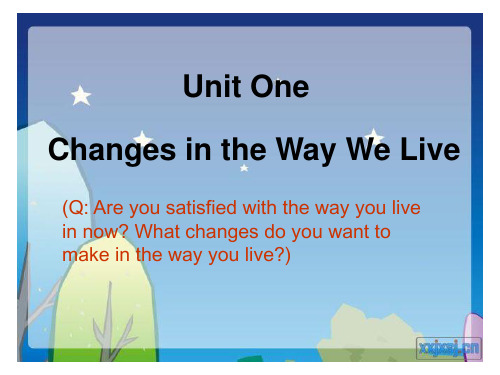
In America many people have a romantic idea of life in the countryside. Many living in towns dream of starting up their own farms, of living off the land (依靠土地为生) . Few get round to putting their dreams into practice. This is perhaps just as well as the life of a farmer is far from easy, as Jim Doherty discovered when he settled down in the country. Nevertheless, as he explains, he has no regrets and remains enthusiastic about his decision to change his way of life.
Global Analysis of Text A
Part I (1-3) The writer views his life in the country as a self-reliant ________ and ________ satisfying one.
1.Why does Mr. Doherty change to settle down in the country ? (want to..., get tired of...) 2. Go over Paras. 2 and 3 to find the topic sentence of each paragraph, and then analyze the relationship between the topic sentence and the rest of the paragraph. (supporting details)
新编大学英语第三版综合教程3答案
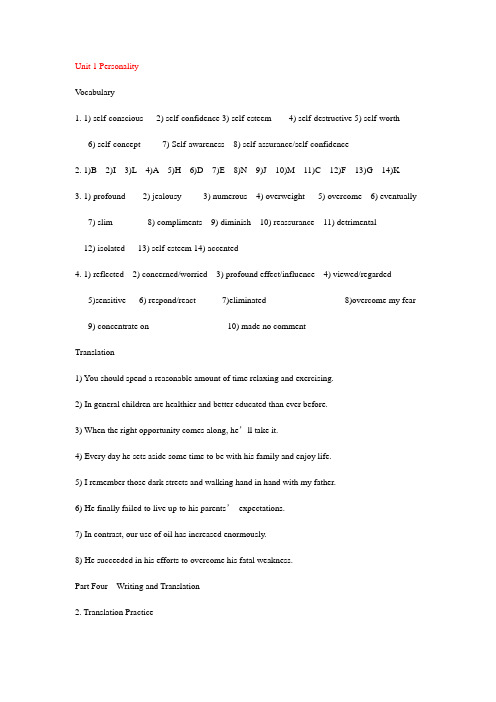
Unit 1 PersonalityV ocabulary1. 1) self-conscious 2) self-confidence 3) self-esteem 4) self-destructive 5) self-worth6) self-concept 7) Self-awareness 8) self-assurance/self-confidence2. 1)B 2)I 3)L 4)A 5)H 6)D 7)E 8)N 9)J 10)M 11)C 12)F 13)G 14)K3. 1) profound 2) jealousy 3) numerous 4) overweight 5) overcome 6) eventually7) slim 8) compliments 9) diminish 10) reassurance 11) detrimental12) isolated 13) self-esteem 14) accented4. 1) reflected 2) concerned/worried 3) profound effect/influence 4) viewed/regarded5)sensitive 6) respond/react 7)eliminated 8)overcome my fear9) concentrate on 10) made no commentTranslation1) You should spend a reasonable amount of time relaxing and exercising.2) In general children are healthier and better educated than ever before.3) When the right opportunity comes along, he’ll take it.4) Every day he sets aside some time to be with his family and enjoy life.5) I remember those dark streets and walking hand in hand with my father.6) He finally failed to live up to his parents’expectations.7) In contrast, our use of oil has increased enormously.8) He succeeded in his efforts to overcome his fatal weakness.Part Four Writing and Translation2. Translation Practice1) It is believed that pessimism often leads to hopelessness, sickness and failure.2) Optimism, by contrast, can make you happy, healthy and successful.3) When you fail in something, profit from the failure as a learning experience.4) Think about your strengths and build up self-confidence in front of problems or difficulties.5) Don’t let negative thoughts hold you back.6) Everyone has experienced failures and disappointments, so don’t blame yourself too much.Unit 2 Myths and LegendsV ocabulary1. 1) A. invitation B. invited C. inviting 2) A. prepare B. prepared C. preparation D. preparatory/preparation3) A. discoveries B. discoverers C. discovered4) A. approval B. approve C. approved D. approving E. disapprove5) A. eloquent B. eloquence C. eloquently6) A. faithful B. unfaithful/faithless C. faith d. faithfully7) A. occasional B. occasionally C. occasion8) A. delivery B. delivering C. delivered9) A. troublesome B. troubled C. troubled D. troubling 10) A. assurance B. assured C. assure2. 1) got/ran into trouble 2) no trouble 3) asking for trouble 4) have …trouble 5) troublewith6) in serious/deep/big trouble 7) get/getting …into trouble 8) took the trouble3. 1) with a pattern of roses 2) prepared a wonderful/goof meal for us3) promised faithfully 4) deliver this letter5) a selection of milk and plain chocolate 6) keep out of mischief/behave themselves7) the sound of distant thunder 8) received approval from the government9) in spite of the fact that he drank too much 10) agree whether the drug is safe or notPart Three Further Development5. Complete the following Ancient Chinese story by translating the Chinese into English1) the true reason why there was no such animal in Guizhou2) they were of no use at all in this place3) when he saw the donkey all of a sudden, he thought it was a monster4) he hid himself in the trees while looking at the donkey5) what kind of animal is this and why does it look different from other animals that I’ve seen?6) But one day the donkey stretched its thin neck and cried7) the tiger discovered that the donkey didn’t have any other skills besides crying8) But he dared not rush to it and eat it just as he did to other animals9) This did irritate the donkey (made the donkey angry), who raised its hind leg and kicked thetiger10) This time he rushed to it without hesitation and bit its rhroatPart Four Writing and Translation2. Translation Practice万物之初天地还是一体充满混沌。
(新编大学英语三课后习题答案汇总)BOOK3书上英语答案
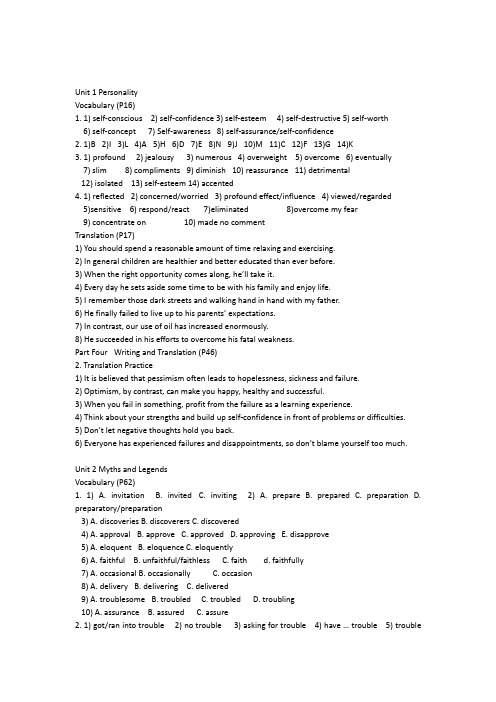
Unit 1 PersonalityVocabulary (P16)1. 1) self-conscious 2) self-confidence 3) self-esteem 4) self-destructive 5) self-worth6) self-concept 7) Self-awareness 8) self-assurance/self-confidence2. 1)B 2)I 3)L 4)A 5)H 6)D 7)E 8)N 9)J 10)M 11)C 12)F 13)G 14)K3. 1) profound 2) jealousy 3) numerous 4) overweight 5) overcome 6) eventually7) slim 8) compliments 9) diminish 10) reassurance 11) detrimental12) isolated 13) self-esteem 14) accented4. 1) reflected 2) concerned/worried 3) profound effect/influence 4) viewed/regarded5)sensitive 6) respond/react 7)eliminated 8)overcome my fear9) concentrate on 10) made no commentTranslation (P17)1) You should spend a reasonable amount of time relaxing and exercising.2) In general children are healthier and better educated than ever before.3) When the right opportunity comes along, he’ll take it.4) Every day he sets aside some time to be with his family and enjoy life.5) I remember those dark streets and walking hand in hand with my father.6) He finally failed to live up to his parents’ expectations.7) In contrast, our use of oil has increased enormously.8) He succeeded in his efforts to overcome his fatal weakness.Part Four Writing and Translation (P46)2. Translation Practice1) It is believed that pessimism often leads to hopelessness, sickness and failure.2) Optimism, by contrast, can make you happy, healthy and successful.3) When you fail in something, profit from the failure as a learning experience.4) Think about your strengths and build up self-confidence in front of problems or difficulties.5) Don’t let negative thoughts hold you back.6) Everyone has experienced failures and disappointments, so don’t blame yourself too much.Unit 2 Myths and LegendsVocabulary (P62)1. 1) A. invitation B. invited C. inviting 2) A. prepare B. prepared C. preparation D. preparatory/preparation3) A. discoveries B. discoverers C. discovered4) A. approval B. approve C. approved D. approving E. disapprove5) A. eloquent B. eloquence C. eloquently6) A. faithful B. unfaithful/faithless C. faith d. faithfully7) A. occasional B. occasionally C. occasion8) A. delivery B. delivering C. delivered9) A. troublesome B. troubled C. troubled D. troubling10) A. assurance B. assured C. assure2. 1) got/ran into trouble 2) no trouble 3) asking for trouble 4) have … trouble5) troublewith6) in serious/deep/big trouble 7) get/getting … into trouble8) took the trouble3. 1) with a pattern of roses 2) prepared a wonderful/goof meal for us3) promised faithfully 4) deliver this letter5) a selection of milk and plain chocolate 6) keep out of mischief/behave themselves7) the sound of distant thunder 8) received approval from the government9) in spite of the fact that he drank too much 10) agree whether the drug is safe or notPart Three Further Development5. Complete the following Ancient Chinese story by translating the Chinese into English(P93)1) the true reason why there was no such animal in Guizhou2) they were of no use at all in this place3) when he saw the donkey all of a sudden, he thought it was a monster4) he hid himself in the trees while looking at the donkey5) what kind of animal is this and why does it look different from other animals that I’ve seen?6) But one day the donkey stretched its thin neck and cried7) the tiger discovered that the donkey didn’t have any other skills besides crying8) But he dared not rush to it and eat it just as he did to other animals9) This did irritate the donkey (made the donkey angry), who raised its hind leg and kicked the tiger10) This time he rushed to it without hesitation and bit its rhroatPart Four Writing and Translation2. Translation Practice(P96)万物之初,天地还是一体,充满混沌。
《新编大学英语3》Unit 1

Book3 Unit 1-11. An Introduction to PersonalityIn a general sense, the term “personality”refers to all the personal and moral characteristics that determine the way a person thinks, feels and acts in his or her social and personal relations.These traits include a vast variety of attitudes and attributes, such as: shyness, generosity, patience, flexibility, sadness, humor, cheerfulness, selfishness, independence and aggressiveness.Most people are a mix of positive and negative traits. Personality traits that are valued in one culture may be frowned upon in another culture.Most research tends to suggest that our basic personality is inherited but that many factors shape and mould our personality as we grow mature.Recognizing one’s strengths and weaknesses is an important step in the process of personal development.In recent years, various studies have shown that health and personality are interrelated. In constantly looking at the dark side of things, pessimists can become discouraged to feel helpless; optimists, on the other hand, attempt to make the best of a situation.2. Mr. and Miss So and SoDirections: Work in pairs to complete these imaginary names to form adjectives that describe a person’s personality.3. Personality and JobWords used to describe a person’s personality.aggressive, amiable, arrogant, artful, brave, broad-minded, carefree, caring, cheerful, compassionate, competitive, conservative, courageous, demanding, determined, dominant, dynamic, egocentric, extroverted, flexible, generous, idle,light-hearted, lively, logical, loyal, malicious, mean, moody, outgoing, passionate, practical, proud, rational, realistic, reserved, ruthless, self-centered, sinister, spiteful, strong-willed, unscrupulous, vain, violent, well-organized…Directions: Discuss with your partner and decide the personality traits that you think would make an ideal person for the following job.Words and phrases1. accent v. to emphasize a part of something 强调,使突出1) Skillful use of make-up can accent your cheekbones and hide small blemishes.2) The side tables were accented by fresh flower arrangements.accent n. a way of pronouncing the words of a language that shows which country, area or social class a person comes from 口音,腔调1) a northern/Dublin/Indian/Scottish accent2) a strong/broad accent (= one that is very noticeable)3) She spoke English with an accent.2. a special importance that is given to something强调,注重In all our products, the accent is on quality.3. the emphasis that you should give to part of a word when saying it重音In “today”, the accent is on the second syllable.acquaintance n.a person whom one knows but who is not a close friend 相识的人,泛泛之交1) He has a wide circle of acquaintances.2) She is an old acquaintance.◆have a passing/nodding acquaintance with sb./sth.I must admit I have only a passing acquaintance with his books.◆make sb.’s acquaintance / make the acquaintance of sb.I made his acquaintance at a party.circulate v.1. to move around within a system, or to make something do this循环,环行1) Ceiling fans circulated warm air around the room.2) The condition prevents the blood from circulating freely.2. if information, facts, ideas etc. circulate, they become known by many people传播,流传Rumors began circulating that the Prime Minister was seriously ill.3. to talk to a lot of different people in a group, especially at a party交往I circulated among the guests during the party.contrast n.1. a difference between people, ideas, situations, things etc. that are being compared对比,对照1)While there are similarities in the two cultures, there are also great contrasts.2) The birth rate for older women has declined, but, by contrast, births to teenage mothers have increased.3) The stock lost 60 cents a share, in contrast to last year, when it gained 21 cents.4) The economic and social contrasts between the poor and the rich.2. something that is very different from something else: 形成对比的人或物1) The sauce is quite sweet, so add dried thyme as a contrast.2) The red stems of this bush provide a contrast to the drab brown of the winter garden.3. the degree of difference between the light and dark parts of a television picture, X-ray, photocopy etc.: 对比度,反差1) This button adjusts the contrast.2) The chemical heightens contrast between different kinds of tissue in the breast.contrast v.1. if two things contrast, the difference between them is very easy to see and is sometimes surprising形成对比1) The snow was icy and white, contrasting with the brilliant blue sky.2) These results contrast sharply with other medical tests carried out in Australia.2. to compare two things, ideas, people etc. to show how different they are from each other使成对比,使成对照1) In another passage, Melville again contrasts the land with the sea.2) The documentary contrasts the reality of war with its romanticized image.dwell(vi.) (dwelt or dwelled) (Line 31, Para. 4) 1) dwell in /at: reside居住2) dwell on / upon: think, speak or write at length about凝思;详细;论述;仔细研究不要过分沉溺在痛苦的回忆之中。
新目标大学英语(第二版)视听说教程3Unit1答案

新目标大学英语(第二版)视听说教程3Unit1答案Unit1 Personality01.Unit Goals 略02.Quotation 略03.Lead-inI.1.know me 2.play a part 3.wear a mask 4.my heart 5.Staring 6.I am insideII.1.vain,self-centered,insecure,intelligent2.demonic,impetuous,talented,bold3.accomplished,learned,resourceful,loyal4.humorous,self-sufficient,courageous,calm5.conscientious,competitive,humble,brave6.well-educated,careful,bright,sentimental,feminineIII.1.I like Hua Mulan’s personality. She was brave and determined. Hua Mulan was a legendary/fictional female warrior from the Northern and Southern Dynasties period of Chinese history. Disguised as a man, she took her aged father’s place in the army. Mulan fought for twelve years and gained high merit, but she refused any reward and retired to her hometown.2. I strongly agree with this proverb. Our destiny is often decided by how we choose and what we do. And our character determines how we choose and what we do. In turn, those choices and actions shape our character too. Character tells who we are and determines what happens in our life and what path we take.I will take Scarlett as an example. Katie Scarlett O’Hara is a fictional character in Margaret Mitchell’s 1936 novel Gone with the Wind. She is vain, self-centered, and spoiled by her wealthy parents. She can also be insecure, but is very intelligent, despite the Old South’s pretense of ignorance and helplessness. She is somewhat unusual among Southern women, whom society preferred to act as dainty creatures who need protection from their men. All her life experiences are greatly influenced by her personality.04.Note-Taking skill略05.Task1ExerciseI. 1-5 FTTFTExerciseII. 1.thinking 2.feeling 3.acting municating 5.listener 6.interesting 7.optimistic 8.encouraging 9.supportive 10.integrity 11.respect 12.yourself 13.radiant 14.engaging 15.perfect06.Task2ExerciseI. 1.career 2.personality 3.yourself 4.tools5.selfassessments6.extrovert7.social8.being around people9.introvert 10.oneself 11.solitary 12.social settings 13.have apartnership 14.schedule 15.how you fit into the jobExerciseII. 1.C 2.C 3.AExerciseIII. 1-5 TFTTT07.ExerciseI. 1.traits 2.outlook 3.boils down to 4.get a clearpicture of 5.social settings08.ExerciseII. 1.social settings 2.boils down to 3.traits 4.outlook5.get a clear picture of09.ExerciseIII. 1.If you keep practicing, you are well on your way toestablishing yourself among the top players in the world.2.Tom wants to discontinue the relationship, whileRebecca wants to continue.3.It’s important to comfort him while he was working,because the less he worried, the better he worked.10.ExerciseIV. 1.work on developing these traits for ourselves 2.facilitate and develop your confidence 3.as accurate as we think they are 4.be comfortable with yourself in the type of work that you’re doing 5.you’re more of an introvert11.Presentation 略12.Exercise 略 Answers may vary13.Critical ThinkingExerciseI. 1 D.open 2 C.conscientious 3 E.extrovert 4 A.agreeable 5 B.neuroticExerciseII. Openness:Openness indicates how open-minded a person is.A person with a high level of openness to experience enjoys trying new things. They are imaginative, curious, and open-minded. Conscientiousness:Conscientiousness is the personality trait of being careful, or diligent. Conscientiousness implies a desire to do a task well, and to take obligations to others seriously.Extroversion:Extroversion (also spelled extraversion) is defined, by Carl Jung, as “an attitude-type characterized by concentration of interest on the external object”. Extroversion tends to be manifested in outgoing, talkative, energetic behaviour, whereas introversion is manifested in more reserved and solitary behaviour. Agreeableness:Agreeableness is a personality trait manifesting itself in individual behavioural characteristics that are perceived as kind, sympathetic, cooperative, warm, and considerate.Neuroticism:Individuals who are neurotic are more likely than average to be moody and to experience such feelings as anxiety, worry, fear, anger, frustration, envy, jealousy, guilt, depressed mood, and loneliness. They respond worse to stressors and are more likely to interpret ordinary situations as threatening and minor frustrations as hopelessly difficult. They are often self-conscious and shy, and they may have trouble controlling urges and delaying gratification. ExerciseIII. 1.I am an agreeable person. I find it important to getalong with others and I’m willing to put aside my interests for other people. I feel it hard to say NO to others. People like to come to me and I never refuse to help them even though I myself am busy at that time.2.Personality traits predict general patterns of behaviour over time rather than single instances of behaviour. Odelia is excited and interested because she is an open person. She plans to explore the island and learns new things. Claire is concerned about the seriousness of the situation because she is a conscientious person. She wants to make sure that they can survive. Emile is thrilled because he is an extrovert. He wants to celebrate and explore the island with others. Albert is kind because he is an agreeable person. He cares for Nora and agrees to everything. Nora has a breakdown because she is a neurotic person. She feels stressed and lost.3.Emile has the idea to make a fire. He calls the others to help. Claire immediately starts to work, Albert brings more wood, Odelia is holding up her beautifully arranged SOS sign while Nora screams desperately for help.14.Conversation1.C2.B3.C4.D1.uncomfortable2.pretendmon4.movement5.tell15.Passage1.D2.C3.B1.age;gender;socia-economic backgrounds2.gifted;flexible;the same type;high expectationsmitted to;pushes me forward16.Lecture1.B2.C3.D1.Four types of people/personalities2.extremely organized3.credibility4.(very)analytical5.all the detailspetitive7.energetic8.talk to people9.great with relationships 10.hugging 11.kisses 12.himself/herself 13.he/she works with17.Goal Checking YES。
新编大学英语第三册课文翻译课后习题答案after_class_reading翻译1.doc
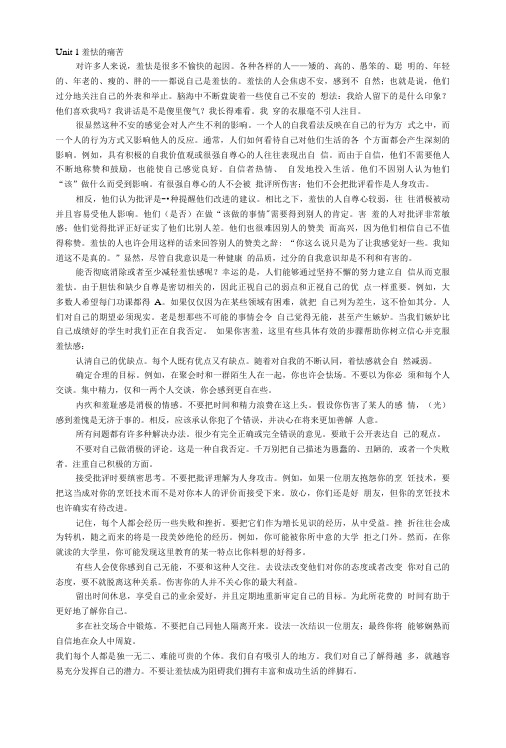
Unit 1羞怯的痛苦对许多人来说,羞怯是很多不愉快的起因。
各种各样的人——矮的、高的、愚笨的、聪明的、年轻的、年老的、瘦的、胖的——都说自己是羞怯的。
羞怯的人会焦虑不安,感到不自然;也就是说,他们过分地关注自己的外表和举止。
脑海中不断盘旋着一些使自己不安的想法:我给人留下的是什么印象?他们喜欢我吗?我讲话是不是傻里傻气?我长得难看。
我穿的衣服毫不引人注目。
很显然这种不安的感觉会对人产生不利的影响。
一个人的自我看法反映在自己的行为方式之中,而一个人的行为方式又影响他人的反应。
通常,人们如何看待自己对他们生活的各个方面都会产生深刻的影响。
例如,具有积极的自我价值观或很强自尊心的人往往表现出自信。
而由于自信,他们不需要他人不断地称赞和鼓励,也能使自己感觉良好。
自信者热情、自发地投入生活。
他们不因别人认为他们“该”做什么而受到影响。
有很强自尊心的人不会被批评所伤害;他们不会把批评看作是人身攻击。
相反,他们认为批评是-•种提醒他们改进的建议。
相比之下,羞怯的人自尊心较弱,往往消极被动并且容易受他人影响。
他们(是否)在做“该做的事情"需要得到别人的肯定。
害羞的人对批评非常敏感;他们觉得批评正好证实了他们比别人差。
他们也很难因别人的赞美而高兴,因为他们相信自己不值得称赞。
羞怯的人也许会用这样的话来回答别人的赞美之辞: “你这么说只是为了让我感觉好一些。
我知道这不是真的。
”显然,尽管自我意识是一种健康的品质,过分的自我意识却是不利和有害的。
能否彻底消除或者至少减轻羞怯感呢?幸运的是,人们能够通过坚持不懈的努力建立自信从而克服羞怯。
由于胆怯和缺少自尊是密切相关的,因此正视自己的弱点和正视自己的优点一样重要。
例如,大多数人希望每门功课都得A。
如果仅仅因为在某些领域有困难,就把自己列为差生,这不恰如其分。
人们对自己的期望必须现实。
老是想那些不可能的事情会令自己觉得无能,甚至产生嫉妒。
当我们嫉妒比自己成绩好的学生时我们正在自我否定。
浙大版新编大学英语【3】答案(2020年整理).pptx
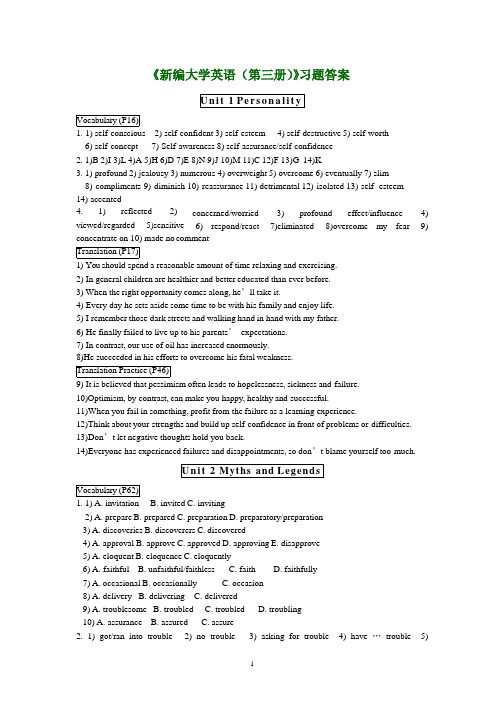
Unit 2 Myths and Legends
Vocabulary (P62)
1. 1) A. invitation B. invited C. inviting
2) A. prepare B. prepared C. preparation D. preparatory/preparation
3) A. discoveries B. discoverers C. discovered
8) compliments 9) diminish 10) reassurance 11) detrimental 12) isolated 13) self- esteem 14) accented 4. 1) reflected 2) concerned/worried 3) profound effect/influence 4) viewed/regarded 5)sensitive 6) respond/react 7)eliminated 8)overcome my fear 9) concentrate on 10) made no comment Translation (P17)
新编大学英语(第二版)第三册汉译英翻译
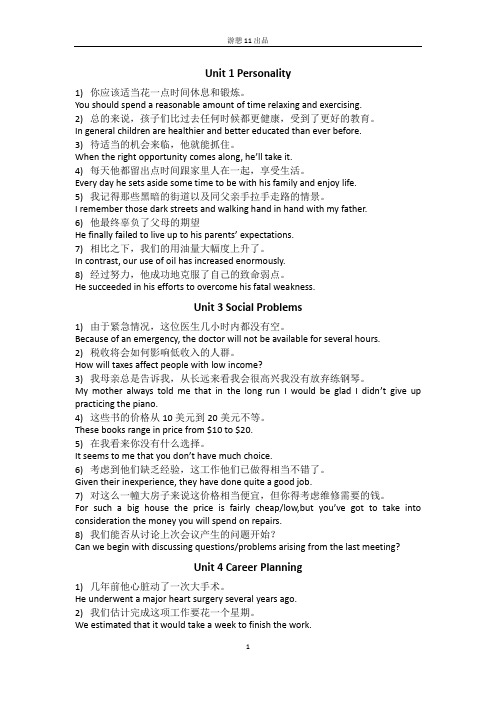
Unit 1 Personality1)你应该适当花一点时间休息和锻炼。
You should spend a reasonable amount of time relaxing and exercising.2)总的来说,孩子们比过去任何时候都更健康,受到了更好的教育。
In general children are healthier and better educated than ever before.3)待适当的机会来临,他就能抓住。
When the right opportunity comes along, he’ll take it.4)每天他都留出点时间跟家里人在一起,享受生活。
Every day he sets aside some time to be with his family and enjoy life.5)我记得那些黑暗的街道以及同父亲手拉手走路的情景。
I remember those dark streets and walking hand in hand with my father.6)他最终辜负了父母的期望He finally failed to live up to his parents’ expectations.7)相比之下,我们的用油量大幅度上升了。
In contrast, our use of oil has increased enormously.8)经过努力,他成功地克服了自己的致命弱点。
He succeeded in his efforts to overcome his fatal weakness.Unit 3 Social Problems1)由于紧急情况,这位医生几小时内都没有空。
Because of an emergency, the doctor will not be available for several hours.2)税收将会如何影响低收入的人群。
新编大学英语第三册第一单元

❖ Recognizing one's strengths and weaknesses is an important step in the process of personal development because it can bolster serf-confidence and motivate the desire to improve oneself.
❖Most people are a mix of positive and negative traits. Personality traits that are valued in one culture may be frowned upon in another culture. Similarly, qualities that are encouraged in boys might be regarded as negative traits in girls.
❖A selfish person might discover that selfishness does not create lasting friendships.
❖An ill-tempered or intolerant person might find cooperative teamwork very difficult.
Personality (4)
❖A person who is able to evaluate his or her strong points and weak points--with the help of parents, friends, teachers or aptitude tests--is also better equipped to make career choices.
新编大学英语3完整版答案!!!
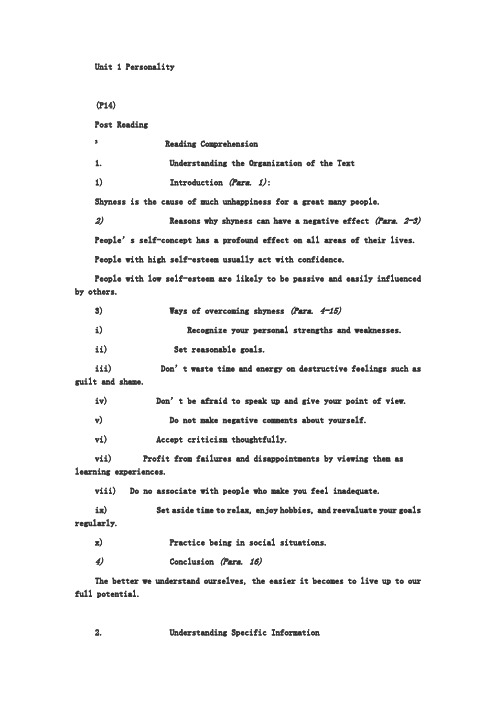
Unit 1 Personality(P14)Post Reading³ Reading Comprehension1. Understanding the Organization of the Text1) Introduction (Para. 1):Shyness is the cause of much unhappiness for a great many people.2) Reasons why shyness can have a negative effect (Para. 2-3)People’s self-concept has a profound effect on all areas of their lives.People with high self-esteem usually act with confidence.People with low self-esteem are likely to be passive and easily influenced by others.3) Ways of overcoming shyness (Para. 4-15)i) Recognize your personal strengths and weaknesses.ii) Set reasonable goals.iii) Don’t waste time and energy on destructive feelings such as guilt and shame.iv) Don’t be afraid to speak up and give your point of view.v) Do not make negative comments about yourself.vi) Accept criticism thoughtfully.vii) Profit from failures and disappointments by viewing them as learning experiences.viii) Do no associate with people who make you feel inadequate.ix) Set aside time to relax, enjoy hobbies, and reevaluate your goals regularly.x) Practice being in social situations.4) Conclusion (Para. 16)The better we understand ourselves, the easier it becomes to live up to our full potential.2. Understanding Specific Information1) F 2) T 3) T 4)T 5) F 6) T 7) F 8)F 9) T3. (略)Vocabulary Practice1.”Self-” is a prefix which means ‘of, to or by oneself or itself.’Words with the prefix “self-” that appear in the text:self-conscious, self-concept, self-assurance, self-worth, self-confidence,self-esteem, self-destructive, self-awareness, self-acceptance, self-rejection, self-confident.1. self-conscious (worried and embarrassed about what you look like or what other people think of you)2. self-confidence (belief in one’s own ability, power, judgment, etc.; confidence in oneself)3. self-esteem (the feeling that you are someone who deserves to be liked, respected, or admired)4. self-destructive (with thoughts or actions that are counter to one’s own best interests)5. self-worth (the value you give to your life and achievements)6. self-concept (one’s conception or general idea of one’s own basic character and nature)7. Self-awareness (realistic knowledge and judgment about oneself)8. self-assurance / self-confidence (the belief that you are able to deal with people and problems easily)2. 1) B 2) I 3) L 4)A 5) H 6) D 7) E8) N 9) J 10) M 11)C 12) F 13) G 14) K3. 1) profound 2) jealousy 3) numerous 4) overweight 5) overcome6) eventually 7) slim 8) compliments 9) diminish 10) reassurance11) detrimental12) isolated 13) self-esteem 14) accented4. 1) reflected 2) concerned / worried 3) profound effect / influence4) viewed / regarded 5) sensitive 6) respond / react7)eliminated 8) overcome my fear 9) concentrate on10) made no commentTranslation1. You should spend a reasonable amount of time relaxing and exercising.2. In general children are healthier and better educated than ever before.3. When the right opportunity come along, he’ll take it.4. Every day he sets aside some time to be with his family and enjoy life.5. I remember those dark streets and walking hand in hand with my father.6. He finally failed to live up to his parents’ expectations.7. In contrast, our use of oil has increased enormously.8. He succeeded in his efforts to overcome his fatal weakness.Part Four Writing and Translation(P 46)2. Translation PracticeFrom Chinese into English1) It is believed that pessimism often leads to hopelessness, sickness and failure.2) Optimism, by contrast, can make you happy, healthy and successful.3) When you fail in something, profit from the failure as a learning experience.4) Think about your strengths and build up self-confidence in front of problems or difficulties.5) Don’t let negative thoughts hold you back.6) Everyone has experienced failures and disappointments, so don’t blame yourself too much.Unit 2 Myths and Legends(P60)Post Reading³ Reading Comprehension1. Testing Your Memory1) Because they were invited to a feast in the sky.2) He saw the birds were busy preparing.3) He planned to go to the feast / sky with the birds.4) They didn’t agree because Tortoise was mischievous / cunning and ungrateful.5) With a sweet tongue, he convinced the birds that he was a changed man.6) He made two wings with all the feathers he got from each bird.7) All of you.8) Nuts, meat and fish soup, pounded yam, yam soup, palm wine, etc.9) For whom have you prepared this feast?10) Because he knew the answer would be “For all of you”, which was his new name. So he could enjoy all the food first.11) They were very angry.12) They took back the feathers they had lent him.13) He asked them to take a message to his wife.14) Parrot, because he wanted to take advantage of the chance to get revenge.15) He asked Parrot to tell his wife to bring out all the soft things in his house and cover the ground with them so that he would be able to land safely. But Parrot told his wife to bring out all the hard and sharp things instead.16) His shell was broken into hundreds of pieces.2. Finding the Best SummarySample:Ekwefi is telling a story about Tortoise. Long long ago, there was a famine, and the birds got an invitation from the sky to attend a feast there. Tortoise learned about it and with his sweet tongue he persuaded the birds to take him with them and so each bird lent him a feather. Tortoise cunningly thought of an idea that enabled him to have all the food by naming himself "All of you". When they reached the sky, they received a warm welcome, and soon the food was presented to them. Then he asked one of the people in the sky, "For whom have you prepared all this feast?" The man replied: "For all of you." So he ate almost all the best food. The birds became very angry and took back their feathers before flying home. Without feathers, he had to jump onto the ground and his shell was broken into pieces.3. Acting out the Story(略)4. Taking SidesSample:1) I don't admire Tortoise's cleverness. He was unwise to cheat all the birds. After his mischief, how could he have face to live together with them any longer? He would have no friends at all. He was clever, but at the same time he was also stupid . When all the birds became so angry, how could he have trusted Parrot? He should have jumped into the sea to avoid being hurt.I sympathize with the birds. They took Tortoise out of kindness, but after flying such a long distance, they had to fly back home on an empty stomach. They were formally invited, but the food was eaten by Tortoise. I think the birds were very unlucky.2) I learned from the story that a) we should be honest, and shouldn't cheat others. If we cheat others, we will be punished in the end; b) we shouldn't be carriedaway by sweet words, like the birds; c) a leopard can't change its spots, nor can Tortoise. He was cunning, he could never change his personality and behave himself.Vocabulary Practice1. 1) A. invitation B.invited C. inviting2) A. prepare B.prepared C. preparationD. preparatory / preparation3) A. discoveries B.discoverers C. discovered4) A. approval B.approve C. approved D. approvingE. disapprove5) A. eloquent B.eloquence C. eloquently6) A. faithful B.unfaithful/faithless C.faith D. faithfully7) A. occasional B.occasionally C. occasion8) A. delivery B.delivering C. delivered9) A. troublesome B.troubled C.troubled D. troubling10) A. assurance B.assured C. assure2. 1) got / ran into trouble 2) notrouble 3) asking for trouble4) have … trouble 5) trouble with 6) in serious/deep/big trouble7) get/getting … into trouble 8) took the trouble3. 1) with a pattern of roses2) prepared a wonderful / good meal for us3) promised faithfully4) deliver this letter5) a selection of milk and plain chocolate6) keep out of mischief / behave themselves7) the sound of distant thunder8) received approval from the government9) in spite of the fact that he drank too much10) agree whether the drug is safe or notPart Four Writing and Translation(P 96)2. Translation PracticeFrom English into Chinese万物之初,天地还是一体,充满混沌。
Unit 1 Personality新编大学英语第二版第三册课文翻译
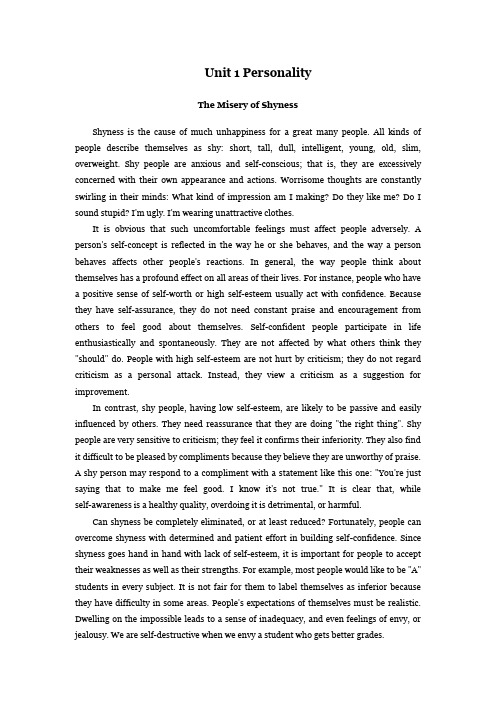
Unit 1 PersonalityThe Misery of ShynessShyness is the cause of much unhappiness for a great many people. All kinds of people describe themselves as shy: short, tall, dull, intelligent, young, old, slim, overweight. Shy people are anxious and self-conscious; that is, they are excessively concerned with their own appearance and actions. Worrisome thoughts are constantly swirling in their minds: What kind of impression am I making? Do they like me? Do I sound stupid? I'm ugly. I'm wearing unattractive clothes.It is obvious that such uncomfortable feelings must affect people adversely. A person's self-concept is reflected in the way he or she behaves, and the way a person behaves affects other people's reactions. In general, the way people think about themselves has a profound effect on all areas of their lives. For instance, people who have a positive sense of self-worth or high self-esteem usually act with confidence. Because they have self-assurance, they do not need constant praise and encouragement from others to feel good about themselves. Self-confident people participate in life enthusiastically and spontaneously. They are not affected by what others think they "should" do. People with high self-esteem are not hurt by criticism; they do not regard criticism as a personal attack. Instead, they view a criticism as a suggestion for improvement.In contrast, shy people, having low self-esteem, are likely to be passive and easily influenced by others. They need reassurance that they are doing "the right thing". Shy people are very sensitive to criticism; they feel it confirms their inferiority. They also find it difficult to be pleased by compliments because they believe they are unworthy of praise.A shy person may respond to a compliment with a statement like this one: "You're just saying that to make me feel good. I know it's not true." It is clear that, while self-awareness is a healthy quality, overdoing it is detrimental, or harmful.Can shyness be completely eliminated, or at least reduced? Fortunately, people can overcome shyness with determined and patient effort in building self-confidence. Since shyness goes hand in hand with lack of self-esteem, it is important for people to accept their weaknesses as well as their strengths. For example, most people would like to be "A" students in every subject. It is not fair for them to label themselves as inferior because they have difficulty in some areas. People's expectations of themselves must be realistic. Dwelling on the impossible leads to a sense of inadequacy, and even feelings of envy, or jealousy. We are self-destructive when we envy a student who gets better grades.If you are shy, here are some specific helpful steps toward building self-confidence and overcoming shyness:1. Recognize your personal strengths and weaknesses. Everyone has both. As self-acceptance grows, shyness naturally diminishes.2. Set reasonable goals. For example, you may be timid about being with a group of strangers at a party. Don't feel that you must converse with everyone. Concentrate on talking to only one or two people. You will feel more comfortable.3. Guilt and shame are destructive feelings. Don't waste time and energy on them. Suppose you have hurt someone's feelings. Feeling ashamed accomplishes nothing. Instead, accept the fact that you have made a mistake, and make up your mind to be more sensitive in the future.4. There are numerous approaches to all issues. Few opinions are completely right or wrong. Don't be afraid to speak up and give your point of view.5. Do not make negative comments about yourself. This is a form of self-rejection. Avoid describing yourself as stupid, ugly, a failure. Accent the positive.6. Accept criticism thoughtfully. Do not interpret it as a personal attack. If, for example, a friend complains about your cooking, accept it as a comment on your cooking, not yourself. Be assured that you are still good friends, but perhaps your cooking could improve.7. Remember that everyone experiences some failures and disappointments. Profit from them as learning experiences. Very often a disappointment becomes a turning point for a wonderful experience to come along. For instance, you may be rejected by the college of your choice. However, at the college you actually attend, you may find a quality of education beyond what you had expected.8. Do not associate with people who make you feel inadequate. Try to change their attitude or yours, or remove yourself from that relationship. People who hurt you do not have your best interests at heart.9. Set aside time to relax, enjoy hobbies, and re-evaluate your goals regularly. Time spent this way helps you learn more about yourself.10. Practice being in social situations. Don't isolate yourself from people. Try making one acquaintance at a time; eventually you will circulate in large groups with skill and self-assurance.Each one of us is a unique, valuable individual. We are interesting in our own personal ways. The better we understand ourselves, the easier it becomes to live up to our full potential. Let's not allow shyness to block our chances for a rich and fulfilling life.羞怯的痛苦对许多人来说,羞怯是很多不愉快的起因。
新编大学英语第二版第三册第一单元Unit One Personality
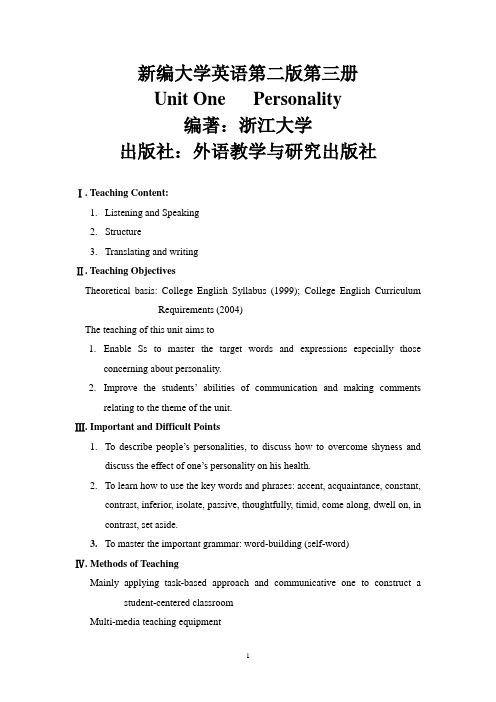
新编大学英语第二版第三册Unit One Personality编著:浙江大学出版社:外语教学与研究出版社Ⅰ. Teaching Content:1.Listening and Speaking2.Structure3.Translating and writingⅡ. Teaching ObjectivesTheoretical basis: College English Syllabus (1999); College English Curriculum Requirements (2004)The teaching of this unit aims to1.Enable Ss to master the target words and expressions especially thoseconcerning about personality.2.Improve the students’ abilities of communication and making commentsrelating to the theme of the unit.Ⅲ. Important and Difficult Points1.To describe people’s personalities, to discuss how to overcome shyness anddiscuss the effect of one’s personality on his health.2.To learn how to use the key words and phrases: accent, acquaintance, constant,contrast, inferior, isolate, passive, thoughtfully, timid, come along, dwell on, in contrast, set aside.3.To master the important grammar: word-building (self-word)Ⅳ. Methods of TeachingMainly applying task-based approach and communicative one to construct a student-centered classroomMulti-media teaching equipmentGroup discussionLive performanceⅤ. Time Allotment (9 periods)Unit 1 The Misery of ShynessPart Ⅰ Preparation & Speaking (2 periods)A. IntroductionIn a general sense, the term personality refers to all the personal and moral characteristics that determine the way a person thinks, feels and acts in his or her social and personal relations. These traits include a vast variety of attitudes and attributes such as shyness, generosity, patience, flexibility, sadness, humor, cheerfulness, selfishness, independence and aggressiveness. Most people are a mix of positive and negative traits. Personality traits that are valued in one culture may be frowned upon in another culture. Similarly, qualities that are encouraged in boys might be regarded as negative traits in girls.It is common that many Chinese students feel self-conscious or uncomfortable to speak English in or out of class. As a result, they lose more opportunities to practice English. Thus, shyness is in the way to English improvement.B. TasksTask 1: Describe Personality1. Figure out the adjectives to describe the following personalities based on the giveninformation.A. He is a liar, and you can’t ask him to do anything for you. (dishonest and unreliable)B. He never buys his friends a drink in a bar. (mean and tight-fisted )C. She knows exactly what she wants to achieve in life and how to get there.(ambitious and single-minded)D. He listens to other people’s opinions, and knows there are always two sides to anargument. (broad-minded and tolerant)E. She just doesn’t seem to realize what she does could hurt other people’s feelings.It’s all me! Me! Me! Me! with her! (thoughtless and self-centered)F. She is very quiet and goes red if anyone speaks to her. (shy and insecure)G. He loves parties and doing his own things. (outgoing and independent)H. She is always asking questions—always wants to know things. (lively andinquisitive)I. She never forgets my birthday. (sensitive and thoughtful)2. Talk about your behavior or experience in your daily life and ask your teammembers to describe your personality.Clue: ambitious, annoying, argumentative, bad-tempered, big-headed, bitchy(脾气坏的,傲慢的), brave, carefree, conservative, conventional, cowardly, crazy,cruel, dull, friendly, amicable, generous, hard-working, honest, amiable,lazy, loyal, mean, modest, moody, naïve, naughty, open-minded,narrow-minded, intolerant, polite, proud, reliable, self-confident, selfish,sensible, sensitive, stubborn, sympathetic, talkative, trustworthy, two-faced,weirdTask 2: Personality and JobDifferent jobs require different personalities. A person who is matched appropriately to the skills and attitudes required for a particular job is more likely to be effective and successful.Role play in the episode of job interview personality traits.Hints:What is your strongest trait?How would your friends or colleagues describe you?What personality traits do you admire?What leadership qualities did you develop as an administrative personnel?What do you find frustrating in a work situation?How do you handle your conflicts with your colleagues in your work?How do you handle your failure?What provide you with a sense of accomplishment?Task 3: Personality and HealthIn recent years, various studies have shown that health and personality are interrelated. Negative attitudes can have negative effects on people’s health.Discuss the effect of one’s personality on his health: a pessimist vs. an optimist.C. Warming-Up Questions (in-class reading)Work in groups to answer the following questions.1. Why do most people describe themselves as shy?SampleBecause they are excessively concerned with their own appearance and actions.They are anxious and self-conscious.2. Would you please list some ways mentioned in the text to overcome shyness?Sample:Firstly we should remember that nobody can be perfect. We should recognize our personal strengths and weaknesses. Secondly we should set reasonable goals.Thirdly we should accept criticism thoughtfully. The most important thing is to study hard and read widely to enrich our knowledge, try to make more friends, and encourage ourselves to get involved in more activiti es in school. In this way we’ll become popular and not shy any more.3. The author has listed some ways in the text to overcome shyness. Which one ispractical and useful to you ?Sample:The writer has mentioned ten ways to overcome shyness. To me, the first and the second are very important. First, we should recognize our personal strengths and weaknesses. By knowing our strengths we can build self-confidence and improve ourselves. Secondly, setting reasonable goal will prevent us from feeling upset and frustrated when we fail. Thirdly we should accept criticism thoughtfully and know that everyone experiences some failures and disappointments.D. HomeworkRemember the new words and phrasesPart Ⅱ In-Class Reading (2 periods)A. Text Structure1. Introduction (Para. 1)Shyness is the cause of much unhappiness for a great many people.2. Reasons why shyness can have a negative effect (Para. 2-3)People’s self-concept has a profound effect on all areas of their lives.People with high self-esteem usually act with confidence.People with low self-esteem are likely to be passive and easily influenced by others.3. Ways of overcoming shyness (Para. 4-15)4. Conclusion (Para. 16)The better we understand ourselves, the easier it becomes to live up to our full potential.B. Sentence Study1. It is obvious that such uncomfortable feelings must affect people adversely. (Line 7)译文:很显然这种不安的感觉会对人们产生不利的影响。
新编大学英语综合教程3课后答案
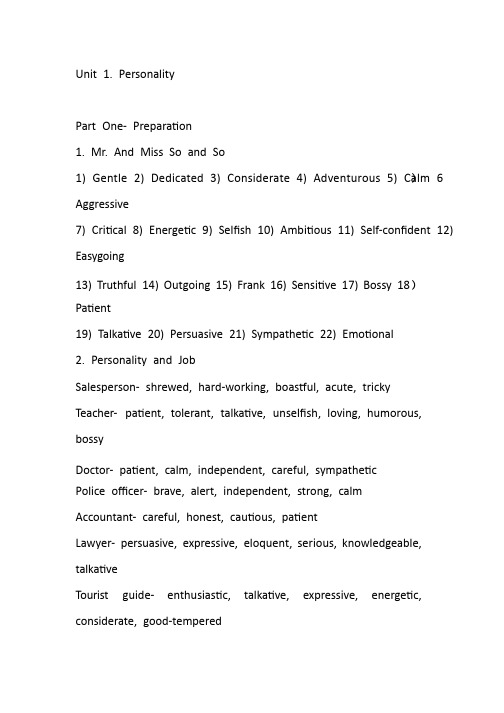
Unit 2 Myths and Legends
Part One– Prepara on 4. Matching Pictures 1. Aphrodite 2. Ares 3. Hephaestus 4. Artemis 5. Demeter 6. Dionysus 7. Poseidon 8. Athena 9. Apollo 10. hermes 11. Hera 12. Zeus Part Two – Post-reading 1. Tes ng Your Memory 1) Because they were invited to a feast in the sky. 2) He saw the birds were busy preparing. 3) He planned to go to the feast/ sky with the birds. 4) They didn’t agree because Tortoise was mischievous/ cunning and ungrateful.
新编大学英语第3册课后答案 (超详细版)
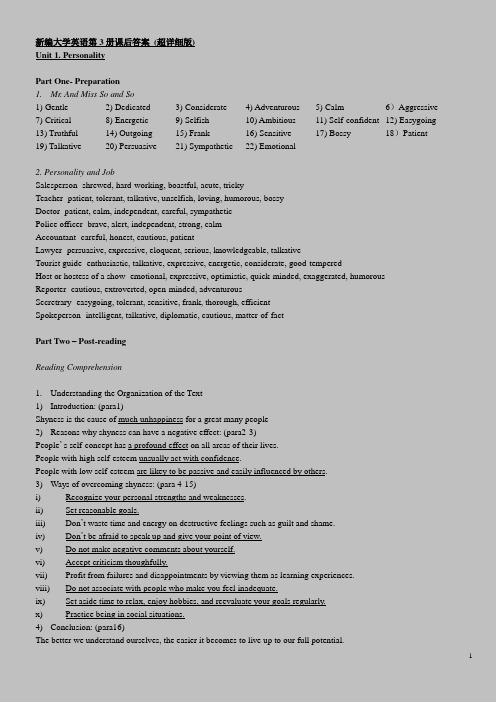
新编大学英语第3册课后答案(超详细版)Unit 1. PersonalityPart One- Preparation1.Mr. And Miss So and So1) Gentle 2) Dedicated 3) Considerate 4) Adventurous 5) Calm 6)Aggressive 7) Critical 8) Energetic 9) Selfish 10) Ambitious 11) Self-confident 12) Easygoing 13) Truthful 14) Outgoing 15) Frank 16) Sensitive 17) Bossy 18)Patient 19) Talkative 20) Persuasive 21) Sympathetic 22) Emotional2. Personality and JobSalesperson- shrewed, hard-working, boastful, acute, trickyTeacher- patient, tolerant, talkative, unselfish, loving, humorous, bossyDoctor- patient, calm, independent, careful, sympatheticPolice officer- brave, alert, independent, strong, calmAccountant- careful, honest, cautious, patientLawyer- persuasive, expressive, eloquent, serious, knowledgeable, talkativeTourist guide- enthusiastic, talkative, expressive, energetic, considerate, good-temperedHost or hostess of a show- emotional, expressive, optimistic, quick-minded, exaggerated, humorousReporter- cautious, extroverted, open-minded, adventurousSecretrary- easygoing, tolerant, sensitive, frank, thorough, efficientSpokeperson- intelligent, talkative, diplomatic, cautious, matter-of-factPart Two – Post-readingReading Comprehension1.Understanding the Organization of the Text1)Introduction: (para1)Shyness is the cause of much unhappiness for a great many people2)Reasons why shyness can have a negative effect: (para2-3)People’ s self-concept has a profound effect on all areas of their lives.People with high self-esteem unsually act with confidence.People with low self-esteem are likey to be passive and easily influenced by others.3)Ways of overcoming shyness: (para 4-15)i)Recognize your personal strengths and weaknesses.ii)Set reasonable goals.iii)Don’t waste time and energy on destructive feelings such as guilt and shame.iv)Don’t be afraid to speak up and give your point of view.v)Do not make negative comments about yourself.vi)Accept criticism thoughfully.vii)Profit from failures and disappointments by viewing them as learning experiences.viii)Do not associate with people who make you feel inadequate.ix)Set aside time to relax, enjoy hobbies, and reevaluate your goals regularly.x)Practice being in social situations.4)Conclusion: (para16)2. Understanding Specific Information1) F 2) T 3) T 4) T 5) F 6)T 7)F 8)F 9)TVocabulary1.1)self-couscious (worried and embarrassed about what you look like or what other people think of you.)2)self-confidence (belief in one’s own ability, power, judgment, etc,; confidence in oneself)3)self-esteem (the feeling that you are someone who deserves to be liked, respected, or admired)4)self-destructive (with thoughts or actions that are counter to one’s own best interests)5)self-worth (the value you give to your life and achievements)6)self-concept (one’s conception or general idea of one’s own basic character and nature)7)self-awareness (realistic knowledge and judgment about oneself)8)self-assurance/self-confidence (the belief that you are able to deal with people and problems easily)2.1) B 2 ) I 3) L 4) A 5) H 6) D 7) E8) N 9) J 10) M 11) C 12) F 13) G 14) K3.1) profound 2)jealousy 3) numerous 4)overweight 5) overcome6) eventually 7) slim 8) compliments 9) diminish 10) reassurance11) detrimental 12) isolated 13) self-esteem 14) accented4.1) reflected 2) concerned/worried 3) profound effect/influence 4) viewed/regarded5) sensitive 6) respond/ react 7) eliminated 8) overcome my fear9) concentrate on 10) made no commentTranslation1)You should spend a reasonable amount of time relaxing and exercising.(spend time on sth/ in doing sth)2)In general children are healthier and better educated than ever before. (than ever before)3)When the right opportunity comes along, he’ll take it.4)Every day he sets aside some time to be with his family and enjoy life.5)I remember those dark streets and walking hand in hand with my father.6)He finally failed to live up to his parents’ expectations.7)In contrast, our use of oil has increased enormously.8)He succeeded in his efforts to overcome his fatal weakness.Part Three – Further Development1. Enriching Your Word Power1) B 2)B 3)A 4) B 5) D 6) C 7)B 8)C 9)A 10)A 11) C 12) BPart Four- Writing and Translation2.1) It is believed that pessimism often leads to hopelessness, sickness and failure.2) Optimism, by contrast, can make you happy, healthy and successful.3) When you fail in something, profit from the failure as a learning experience.4) Think about your strengths and build up self-confidence in front of problems or difficulties.6)Everyone has experienced failures and disappointments, so don’t blame yourself too much.Unit 2 Myths and LegendsPart One – Preparation4. Matching Pictures1. Aphrodite2. Ares3. Hephaestus4. Artemis5. Demeter6. Dionysus7. Poseidon 8. Athena 9. Apollo 10. hermes 11. Hera 12. ZeusPart Two – Post-reading1. Testing Your Memory1) Because they were invited to a feast in the sky.2) He saw the birds were busy preparing.3) He planned to go to the feast/ sky with the birds.4) They didn’t agree because Tortoise was mischievous/ cunning and ungrateful.5) With a sweet tongue, he convinced the birds that he was a changed man.6) He made two wings with all the features he got from each bird.7) All of You.8) Nuts, meat and fish soup, punded yam, yam soup, palm wine, etc.9) For whom have you prepared this feast?10) Because he knew the answer would be “For all of you”, which was his new name. So he could enjoy all the food first.11) They were very angry.12) They took back the feathers they had lent him.13) He asked him to take a message to his wife.14) Parrot, because he wanted to take advantage of the chance to get revenge.15) He asked Parrot to tell his wife to bring out all the soft things in his house and cover the ground with them so that he would be able to land safely. But Parrot told his wife to bring out all the hard and sharp things instead.16) His shell was broken into hundreds of pieces.Vocabulary1.1) A. invitation B. invited C. inviting2) A. prepare B. prepared C. preparation D. preparatory / preparation3) A. discoveries B. discoverers C. discovered4) A. approval B. approve C. approved D. approvign E. disapprove5) A. eloquent B. eloquence C. eloquently6) A. faithful B. unfaithful/ faithless C. faith D. faithfully7) A. occasional B. occasionally C. occasion8) A. delivery B. delivering C. delivered9) A. troubesome B. troulbed C. troubled D. troubling10) A. assurance B. assured C. assure2.1) got/ran into trouble 2) no trouble 3) asking for trouble 4) have…trouble5) trouble with 6) in serious/ deep/ big trouble 7) get/getting …into trouble 8) took the trouble3.1) with a pattern of roses.2) prepared a wonderful / good meal for us3) promised faithfully4) deliver this letter5) a selection of milk and plain chocolate7)the sound of distant thunder8) received approval from the government9) in spite of the fact that he drank too much10)agree whether the drug is safe or notPart Three – Further Development1.Enriching Your Word Power1) C 2) C 3) A 4) B 5)A 6) B 7) A 8) B 9) B 10) A 11) B 12) APart Four – Writing and Translation2.Translation Practice万物之初,天体还是一体,充满混沌。
新编大学英语第3册超详细版

Unit 1. PersonalityPart One- Preparation1.Mr. And Miss So and So1) Gentle 2) Dedicated 3) Considerate 4) Adventurous 5) Calm 6)Aggressive 7) Critical 8) Energetic 9) Selfish 10) Ambitious 11) Self-confident 12) Easygoing 13) Truthful 14) Outgoing 15) Frank 16) Sensitive 17) Bossy 18)Patient 19) Talkative 20) Persuasive 21) Sympathetic 22) Emotional2. Personality and JobSalesperson- shrewed, hard-working, boastful, acute, trickyTeacher- patient, tolerant, talkative, unselfish, loving, humorous, bossyDoctor- patient, calm, independent, careful, sympatheticPolice officer- brave, alert, independent, strong, calmAccountant- careful, honest, cautious, patientLawyer- persuasive, expressive, eloquent, serious, knowledgeable, talkativeTourist guide- enthusiastic, talkative, expressive, energetic, considerate, good-temperedHost or hostess of a show- emotional, expressive, optimistic, quick-minded, exaggerated, humorousReporter- cautious, extroverted, open-minded, adventurousSecretrary- easygoing, tolerant, sensitive, frank, thorough, efficientSpokeperson- intelligent, talkative, diplomatic, cautious, matter-of-factPart Two – Post-readingReading Comprehension1.Understanding the Organization of the Text1)Introduction: (para1)Shyness is the cause of much unhappiness for a great many people2)Reasons why shyness can have a negative effect: (para2-3)People’ s self-concept has a profound effect on all areas of their lives.People with high self-esteem unsually act with confidence.People with low self-esteem are likey to be passive and easily influenced by others.3)Ways of overcoming shyness: (para 4-15)i)Recognize your personal strengths and weaknesses.ii)Set reasonable goals.iii)Don’t waste time and energy on destructive feelings such as guilt and shame.iv)Don’t be afraid to speak up and give your point of view.v)Do not make negative comments about yourself.vi)Accept criticism thoughfully.vii)Profit from failures and disappointments by viewing them as learning experiences.viii)Do not associate with people who make you feel inadequate.ix)Set aside time to relax, enjoy hobbies, and reevaluate your goals regularly.x)Practice being in social situations.4)Conclusion: (para16)The better we understand ourselves, the easier it becomes to live up to our full potential.2. Understanding Specific Information1) F 2) T 3) T 4) T 5) F 6)T 7)F 8)F 9)TVocabulary1.1)self-couscious (worried and embarrassed about what you look like or what other people think of you.)2)self-confidence (belief in one’s own ability, power, judgment, etc,; confidence in oneself)3)self-esteem (the feeling that you are someone who deserves to be liked, respected, or admired)4)self-destructive (with thoughts or actions that are counter to one’s own best interests)5)self-worth (the value you give to your life and achievements)6)self-concept (one’s conception or general idea of one’s own basic character and nature)7)self-awareness (realistic knowledge and judgment about oneself)8)self-assurance/self-confidence (the belief that you are able to deal with people and problems easily)2.1) B 2 ) I 3) L 4) A 5) H 6) D 7) E8) N 9) J 10) M 11) C 12) F 13) G 14) K3.1) profound 2)jealousy 3) numerous 4)overweight 5) overcome6) eventually 7) slim 8) compliments 9) diminish 10) reassurance11) detrimental 12) isolated 13) self-esteem 14) accented4.1) reflected 2) concerned/worried 3) profound effect/influence 4) viewed/regarded5) sensitive 6) respond/ react 7) eliminated 8) overcome my fear9) concentrate on 10) made no commentTranslation1)You should spend a reasonable amount of time relaxing and exercising.(spend time on sth/ in doing sth)2)In general children are healthier and better educated than ever before. (than ever before)3)When the right opportunity comes along, he’ll take it.4)Every day he sets aside some time to be with his family and enjoy life.5)I remember those dark streets and walking hand in hand with my father.6)He finally failed to live up to his parents’ expectations.7)In contrast, our use of oil has increased enormously.8)He succeeded in his efforts to overcome his fatal weakness.Part Three – Further Development1. Enriching Your Word Power1) B 2)B 3)A 4) B 5) D 6) C 7)B 8)C 9)A 10)A 11) C 12) BPart Four- Writing and Translation2.1) It is believed that pessimism often leads to hopelessness, sickness and failure.2) Optimism, by contrast, can make you happy, healthy and successful.3) When you fail in something, profit from the failure as a learning experience.4) Think about your strengths and build up self-confidence in front of problems or difficulties.5) Don’t let negative thoughts hold you back.6)Everyone has experienced failures and disappointments, so don’t blame yourself too much.Unit 2 Myths and LegendsPart One – Preparation4. Matching Pictures1. Aphrodite2. Ares3. Hephaestus4. Artemis5. Demeter6. Dionysus7. Poseidon 8. Athena 9. Apollo 10. hermes 11. Hera 12. ZeusPart Two – Post-reading1. Testing Your Memory1) Because they were invited to a feast in the sky.2) He saw the birds were busy preparing.3) He planned to go to the feast/ sky with the birds.4) They didn’t agree because Tortoise was mischievous/ cunning and ungrateful.5) With a sweet tongue, he convinced the birds that he was a changed man.6) He made two wings with all the features he got from each bird.7) All of You.8) Nuts, meat and fish soup, punded yam, yam soup, palm wine, etc.9) For whom have you prepared this feast?10) Because he knew the answer would be “For all of you”, which was his new name. So he could enjoy all the food first.11) They were very angry.12) They took back the feathers they had lent him.13) He asked him to take a message to his wife.14) Parrot, because he wanted to take advantage of the chance to get revenge.15) He asked Parrot to tell his wife to bring out all the soft things in his house and cover the ground with them so that he would be able to land safely. But Parrot told his wife to bring out all the hard and sharp things instead.16) His shell was broken into hundreds of pieces.Vocabulary1.1) A. invitation B. invited C. inviting2) A. prepare B. prepared C. preparation D. preparatory / preparation3) A. discoveries B. discoverers C. discovered4) A. approval B. approve C. approved D. approvign E. disapprove5) A. eloquent B. eloquence C. eloquently6) A. faithful B. unfaithful/ faithless C. faith D. faithfully7) A. occasional B. occasionally C. occasion8) A. delivery B. delivering C. delivered9) A. troubesome B. troulbed C. troubled D. troubling10) A. assurance B. assured C. assure2.1) got/ran into trouble 2) no trouble 3) asking for trouble 4) have…trouble5) trouble with 6) in serious/ deep/ big trouble 7) get/getting …into trouble 8) took the trouble3.1) with a pattern of roses.2) prepared a wonderful / good meal for us3) promised faithfully4) deliver this letter5) a selection of milk and plain chocolate6) keep out of mischief / behave themselves7)the sound of distant thunder8) received approval from the government9) in spite of the fact that he drank too much10)agree whether the drug is safe or notPart Three – Further Development1.Enriching Your Word Power1) C 2) C 3) A 4) B 5)A 6) B 7) A 8) B 9) B 10) A 11) B 12) APart Four – Writing and Translation2.Translation Practice万物之初,天体还是一体,充满混沌。
新编大学英语3综合教程课文填空练习
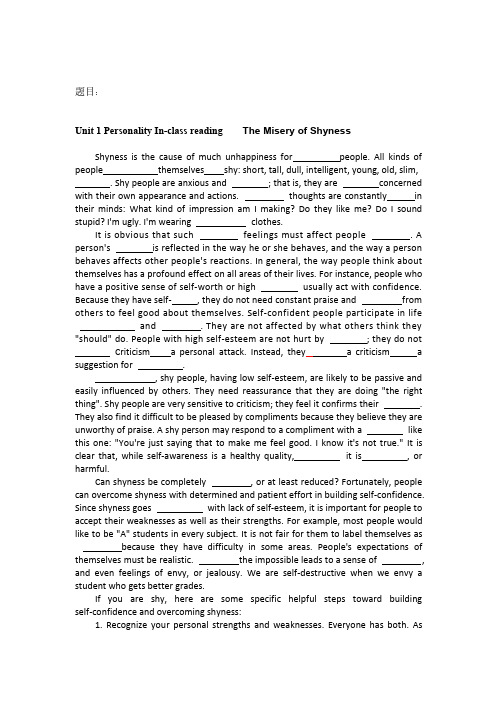
题目:Unit1Personality In-class reading The Misery of ShynessShyness is the cause of much unhappiness for people.All kinds of people themselves shy:short,tall,dull,intelligent,young,old,slim, .Shy people are anxious and;that is,they are concerned with their own appearance and actions.thoughts are constantly in their minds:What kind of impression am I making?Do they like me?Do I sound stupid?I'm ugly.I'm wearing clothes.It is obvious that such feelings must affect people.A person's is reflected in the way he or she behaves,and the way a person behaves affects other people's reactions.In general,the way people think about themselves has a profound effect on all areas of their lives.For instance,people who have a positive sense of self-worth or high usually act with confidence. Because they have self-,they do not need constant praise and from others to feel good about themselves.Self-confident people participate in life and.They are not affected by what others think they "should"do.People with high self-esteem are not hurt by;they do not Criticism a personal attack.Instead,they a criticism a suggestion for.,shy people,having low self-esteem,are likely to be passive and easily influenced by others.They need reassurance that they are doing"the right thing".Shy people are very sensitive to criticism;they feel it confirms their. They also find it difficult to be pleased by compliments because they believe they are unworthy of praise.A shy person may respond to a compliment with a like this one:"You're just saying that to make me feel good.I know it's not true."It is clear that,while self-awareness is a healthy quality,it is,or harmful.Can shyness be completely,or at least reduced?Fortunately,people can overcome shyness with determined and patient effort in building self-confidence. Since shyness goes with lack of self-esteem,it is important for people to accept their weaknesses as well as their strengths.For example,most people would like to be"A"students in every subject.It is not fair for them to label themselves as in because they have difficulty in some areas.People's expectations of themselves must be realistic.the impossible leads to a sense of, and even feelings of envy,or jealousy.We are self-destructive when we envy a student who gets better grades.If you are shy,here are some specific helpful steps toward building self-confidence and overcoming shyness:1.Recognize your personal strengths and weaknesses.Everyone has both.Asself-acceptance grows,shyness naturally diminishes.2.Set goals.For example,you may be about being with a group of strangers at a party.Don't feel that you must with everyone. Concentrate on talking to only one or two people.You will feel more comfortable.3.Guilt and shame are destructive feelings.Don't waste time and energy on them.Suppose you have hurt someone's feelings.Feeling ashamed accomplishes nothing.Instead,accept the fact that you have made a mistake,and make up your mind to be more sensitive in the future.4.There are approaches to all issues.Few opinions are completely right or wrong.Don't be afraid to speak up and give your point of view.5.Do not make negative comments about yourself.This is a form of self-.Avoid describing yourself as stupid,ugly,a failure.the positive.6.Accept criticism.Do not it as a personal attack.If,for example,a friend complains about your cooking,accept it as a comment on your cooking,not yourself.Be that you are still good friends,but perhaps your cooking could improve.7.Remember that everyone experiences some failures and disappointments. Profit from them as learning experiences.Very often a disappointment becomes a turning point for a wonderful experience to.For instance,you may be rejected by the college of your choice.However,at the college you actually attend, you may find a quality of education beyond what you had expected.8.Do not associate with people who make you feel inadequate.Try to change their attitude or yours,or remove yourself from that relationship.People who hurt you do not your best interests.9.Set aside time to relax,enjoy hobbies,and your goals regularly. Time spent this way helps you learn more about yourself.10.Practice being in social situations.Don't yourself from people.Try making one at a time;eventually you will in large groups with skill and self-assurance.Each one of us is a unique,valuable individual.We are interesting in our own personal ways.The better we understand ourselves,the easier it becomes to live up to our full potential.Let's not allow shyness to block our chances for a rich and fulfilling life.Unit1After-class reading Two Ways of Looking at Life Your attitude strongly reflects your outlook on life.Take a closer look at that connection.Are you a pessimist—or an?Can you see how your way of looking actually does color your attitude?And remember:change your outlook and you change your attitude.The father is looking down into the at his sleeping daughter,just home from the hospital.His heart is with and gratitude for the beauty of her,the perfection.The baby opens her eyes and stares straight up.The father calls her name,expecting that she will turn her head and look at him. Her eyes don't move.He picks up a little toy attached to the rail of the crib and shakes it,ringing the bell it contains.The baby's eyes don't move.His heart has begun to beat rapidly.He finds his wife in their bedroom and tells her what just happened."She doesn't seem to respond to noise at all,"he says."It's as if she can't hear.""I'm sure she's all right,"the wife says,pulling her dressing around her. Together they go into the baby's room.She calls the baby's name,the bell,claps her hands.Then she picks up the baby,who immediately becomes lively and makes happy sounds."My God,"the father says."She's deaf.""No,she's not,"the mother says."I mean,it's too soon to say a thing like that. Look,she's.Her eyes don't even focus yet.""But there wasn't the slightest movement,even when you clapped as hard as you could."The mother takes a book from the shelf."Let's read what's in the baby book," she says.She looks up"hearing"and reads out loud:"'Don't be alarmed if your newborn fails to be by loud noises or fails to turn toward sound.Reactions to sound often take some time to develop.Your can test your child's hearing."There,"the mother says."Doesn't that make you feel better?""Not much,"the father says."It doesn't even mention the other possibility,that the baby is deaf.And all I know is that my baby doesn't hear a thing.I've got the worst feeling about this.Maybe it's because my grandfather was deaf.If that beautiful baby is deaf and it's my fault,I'll never forgive myself.""Hey,wait a minute,"says the wife."You're worrying too much.We'll call the pediatrician first thing Monday.,cheer up.Here,hold the baby while I fix her blanket.It's all pulled out."The father takes the baby but gives her back to his wife as soon as he can.All weekend he finds himself unable to prepare for next week's work.He follows his wife around the house,thinking about the baby's hearing and about the way d would ruin her life.He imagines only the worst:no hearing,no development of language,his beautiful child cut off from society,locked in a world.By Sunday night he has sunk into.The mother leaves a message with the pediatrician's answering service asking for an early appointment Monday.She spends the weekend doing her exercises, reading,and trying to calm her husband.The pediatrician's tests are,but the father's spirits remain low.Not until a week later,when the baby shows her first startle to the loud sound of a passing truck,does he begin to recover and enjoy his new daughter again.This father and mother have two different ways of looking at the world. Whenever something bad happens to him—a call from the bank manager,awith his wife,even a from his—he imagines the worst:bankruptcy,j,,and.He is to depression;he often feels extremely tired; his health suffers.She,on the other hand,sees bad events least threatening l.To her,they are challenges to be overcome.After a,she bounces back quickly,and finds all her energy again.Her health is excellent.The optimists and the pessimists:I have been studying them for the past twenty-five years.The defining characteristic of pessimists is that they tend to believe bad events will last a long time,will everything they do,and are their own fault.The optimists,who the same hard knocks of this world,think about in the opposite way.They tend to believe defeat is just a temporary,that its causes are to this one case.The optimists believe defeat is not their fault:circumstances,bad luck,or other people brought it about.Such people are not bothered by defeat.Confronted by a bad situation,they perceive it as a challenge and try harder.These two habits of thinking about causes have consequences.Literally hundreds of studies show that pessimists give up more easily and get depressed more often.These experiments also show that optimists do much better in school and at work.They regularly exceed the of tests.When optimists r office,they than pessimists are.Their health is u good.Evidence suggests they may even live longer.Twenty-five years of study has me that if we believe,as does the pessimist,that misfortune is our fault,is,and will undermine everything we do,more of it will happen to us than if we believe otherwise.I am also c that if we are this view,we will get depressed easily,we will accomplish less than our potential,and we will even get physically sick more often. Pessimistic are.答案:Unit1PersonalityIn-class reading The Misery of ShynessShyness is the cause of much unhappiness for a great many people.All kinds of people describe themselves as shy:short,tall,dull,intelligent,young,old,slim, overweight.Shy people are anxious and self-conscious;that is,they are excessively concerned with their own appearance and actions.Worrisome thoughts are constantly swirling in their minds:What kind of impression am I making?Do they like me?Do I sound stupid?I'm ugly.I'm wearing unattractive clothes.It is obvious that such uncomfortable feelings must affect people adversely.A person's self-concept is reflected in the way he or she behaves,and the way a person behaves affects other people's reactions.In general,the way people think about themselves has a profound effect on all areas of their lives.For instance,people who have a positive sense of self-worth or high self-esteem usually act with confidence. Because they have self-assurance,they do not need constant praise andencouragement from others to feel good about themselves.Self-confident people participate in life enthusiastically and spontaneously.They are not affected by what others think they"should"do.People with high self-esteem are not hurt by criticism; they do not regard criticism as a personal attack.Instead,they view a criticism as a suggestion for improvement.By/In contrast,shy people,having low self-esteem,are likely to be passive and easily influenced by others.They need reassurance that they are doing"the right thing".Shy people are very sensitive to criticism;they feel it confirms their inferiority. They also find it difficult to be pleased by compliments because they believe they are unworthy of praise.A shy person may respond to a compliment with a statement like this one:"You're just saying that to make me feel good.I know it's not true."It is clear that,while self-awareness is a healthy quality,overdoing it is detrimental,or harmful.Can shyness be completely eliminated,or at least reduced?Fortunately,people can overcome shyness with determined and patient effort in building self-confidence. Since shyness goes hand in hand with lack of self-esteem,it is important for people to accept their weaknesses as well as their strengths.For example,most people would like to be"A"students in every subject.It is not fair for them to label themselves as inferior because they have difficulty in some areas.People's expectations of themselves must be realistic.Dwelling on the impossible leads to a sense of inadequacy,and even feelings of envy,or jealousy.We are self-destructive when we envy a student who gets better grades.If you are shy,here are some specific helpful steps toward building self-confidence and overcoming shyness:1.Recognize your personal strengths and weaknesses.Everyone has both.As self-acceptance grows,shyness naturally diminishes.2.Set reasonable goals.For example,you may be timid about being with a group of strangers at a party.Don't feel that you must converse with everyone. Concentrate on talking to only one or two people.You will feel more comfortable.3.Guilt and shame are destructive feelings.Don't waste time and energy on them.Suppose you have hurt someone's feelings.Feeling ashamed accomplishes nothing.Instead,accept the fact that you have made a mistake,and make up your mind to be more sensitive in the future.4.There are numerous approaches to all issues.Few opinions are completely right or wrong.Don't be afraid to speak up and give your point of view.5.Do not make negative comments about yourself.This is a form of self-rejection.Avoid describing yourself as stupid,ugly,a failure.Accent the positive.6.Accept criticism thoughtfully.Do not interpret it as a personal attack.If,for example,a friend complains about your cooking,accept it as a comment on your cooking,not yourself.Be assured that you are still good friends,but perhaps your cooking could improve.7.Remember that everyone experiences some failures and disappointments. Profit from them as learning experiences.Very often a disappointment becomes a turning point for a wonderful experience to come along.For instance,you may berejected by the college of your choice.However,at the college you actually attend, you may find a quality of education beyond what you had expected.8.Do not associate with people who make you feel inadequate.Try to change their attitude or yours,or remove yourself from that relationship.People who hurt you do not have your best interests at heart.9.Set aside time to relax,enjoy hobbies,and reevaluate your goals regularly. Time spent this way helps you learn more about yourself.10.Practice being in social situations.Don't isolate yourself from people.Try making one acquaintance at a time;eventually you will circulate in large groups with skill and self-assurance.Each one of us is a unique,valuable individual.We are interesting in our own personal ways.The better we understand ourselves,the easier it becomes to live up to our full potential.Let's not allow shyness to block our chances for a rich and fulfilling life.Unit1After-class reading Two Ways of Looking at Life Your attitude strongly reflects your outlook on life.Take a closer look at that connection.Are you a pessimist—or an optimist?Can you see how your way of looking actually does color your attitude?And remember:change your outlook and you change your attitude.The father is looking down into the crib at his sleeping newborn daughter,just home from the hospital.His heart is overflowing with awe and gratitude for the beauty of her,the perfection.The baby opens her eyes and stares straight up.The father calls her name,expecting that she will turn her head and look at him. Her eyes don't move.He picks up a furry little toy attached to the rail of the crib and shakes it,ringing the bell it contains.The baby's eyes don't move.His heart has begun to beat rapidly.He finds his wife in their bedroom and tells her what just happened."She doesn't seem to respond to noise at all,"he says."It's as if she can't hear.""I'm sure she's all right,"the wife says,pulling her dressing gown around her. Together they go into the baby's room.She calls the baby's name,jingles the bell,claps her hands.Then she picks up the baby,who immediately becomes lively and makes happy sounds."My God,"the father says."She's deaf.""No,she's not,"the mother says."I mean,it's too soon to say a thing like that. Look,she's brand-new.Her eyes don't even focus yet.""But there wasn't the slightest movement,even when you clapped as hard as you could."The mother takes a book from the shelf."Let's read what's in the baby book," she says.She looks up"hearing"and reads out loud:"'Don't be alarmed if your newborn fails to be startled by loud noises or fails to turn toward sound.Reactionsto sound often take some time to develop.Your pediatrician can test your child's hearing neurologically."There,"the mother says."Doesn't that make you feel better?""Not much,"the father says."It doesn't even mention the other possibility,that the baby is deaf.And all I know is that my baby doesn't hear a thing.I've got the worst feeling about this.Maybe it's because my grandfather was deaf.If that beautiful baby is deaf and it's my fault,I'll never forgive myself.""Hey,wait a minute,"says the wife."You're worrying too much.We'll call the pediatrician first thing Monday.In the meantime,cheer up.Here,hold the baby while I fix her blanket.It's all pulled out."The father takes the baby but gives her back to his wife as soon as he can.All weekend he finds himself unable to prepare for next week's work.He follows his wife around the house,thinking about the baby's hearing and about the way deafness would ruin her life.He imagines only the worst:no hearing,no development of language,his beautiful child cut off from society,locked in a soundless world.By Sunday night he has sunk into despair.The mother leaves a message with the pediatrician's answering service asking for an early appointment Monday.She spends the weekend doing her exercises, reading,and trying to calm her husband.The pediatrician's tests are reassuring,but the father's spirits remain low.Not until a week later,when the baby shows her first startle to the loud sound of a passing truck,does he begin to recover and enjoy his new daughter again.This father and mother have two different ways of looking at the world. Whenever something bad happens to him—a call from the bank manager,a disagreement with his wife,even a frown from his employer—he imagines the worst: bankruptcy,jail,divorce,and dismissal.He is prone to depression;he often feels extremely tired;his health suffers.She,on the other hand,sees bad events in their least threatening light.To her,they are temporary challenges to be overcome.After a reversal,she bounces back quickly,and finds all her energy again.Her health is excellent.The optimists and the pessimists:I have been studying them for the past twenty-five years.The defining characteristic of pessimists is that they tend to believe bad events will last a long time,will undermine everything they do,and are their own fault.The optimists,who are confronted with the same hard knocks of this world,think about misfortune in the opposite way.They tend to believe defeat is just a temporary setback,that its causes are confined to this one case.The optimists believe defeat is not their fault:circumstances,bad luck,or other people brought it about.Such people are not bothered by defeat.Confronted by a bad situation,they perceive it as a challenge and try harder.These two habits of thinking about causes have consequences.Literally hundreds of studies show that pessimists give up more easily and get depressed more often.These experiments also show that optimists do much better in school and at work.They regularly exceed the predictions of aptitude tests.When optimists run for office,they are more apt to be elected than pessimists are.Their health isunusually good.Evidence suggests they may even live longer.Twenty-five years of study has convinced me that if we habitually believe,as does the pessimist,that misfortune is our fault,is enduring,and will undermine everything we do,more of it will happen to us than if we believe otherwise.I am also convinced that if we are in the grip of this view,we will get depressed easily,we will accomplish less than our potential,and we will even get physically sick more often. Pessimistic prophecies are self-fulfilling.。
- 1、下载文档前请自行甄别文档内容的完整性,平台不提供额外的编辑、内容补充、找答案等附加服务。
- 2、"仅部分预览"的文档,不可在线预览部分如存在完整性等问题,可反馈申请退款(可完整预览的文档不适用该条件!)。
- 3、如文档侵犯您的权益,请联系客服反馈,我们会尽快为您处理(人工客服工作时间:9:00-18:30)。
新编大学英语第二版第三册Unit One Personality编著:浙江大学出版社:外语教学与研究出版社Ⅰ. Teaching Content:1.Listening and Speaking2.Structure3.Translating and writingⅡ. Teaching ObjectivesTheoretical basis: College English Syllabus (1999); College English Curriculum Requirements (2004)The teaching of this unit aims to1.Enable Ss to master the target words and expressions especially thoseconcerning about personality.2.Improve the students’ abilities of communication and making commentsrelating to the theme of the unit.Ⅲ. Important and Difficult Points1.To describe people’s personalities, to discuss how to overcome shyness anddiscuss the effect of one’s personality on his health.2.To learn how to use the key words and phrases: accent, acquaintance, constant,contrast, inferior, isolate, passive, thoughtfully, timid, come along, dwell on, in contrast, set aside.3.To master the important grammar: word-building (self-word)Ⅳ. Methods of TeachingMainly applying task-based approach and communicative one to construct a student-centered classroomMulti-media teaching equipmentGroup discussionLive performanceⅤ. Time Allotment (9 periods)Unit 1 The Misery of ShynessPart Ⅰ Preparation & Speaking (2 periods)A. IntroductionIn a general sense, the term personality refers to all the personal and moral characteristics that determine the way a person thinks, feels and acts in his or her social and personal relations. These traits include a vast variety of attitudes and attributes such as shyness, generosity, patience, flexibility, sadness, humor, cheerfulness, selfishness, independence and aggressiveness. Most people are a mix of positive and negative traits. Personality traits that are valued in one culture may be frowned upon in another culture. Similarly, qualities that are encouraged in boys might be regarded as negative traits in girls.It is common that many Chinese students feel self-conscious or uncomfortable to speak English in or out of class. As a result, they lose more opportunities to practice English. Thus, shyness is in the way to English improvement.B. TasksTask 1: Describe Personality1. Figure out the adjectives to describe the following personalities based on the giveninformation.A. He is a liar, and you can’t ask him to do anything for you. (dishonest and unreliable)B. He never buys his friends a drink in a bar. (mean and tight-fisted )C. She knows exactly what she wants to achieve in life and how to get there.(ambitious and single-minded)D. He listens to other people’s opinions, and knows there are always two sides to anargument. (broad-minded and tolerant)E. She just doesn’t seem to realize what she does could hurt other people’s feelings.It’s all me! Me! Me! Me! with her! (thoughtless and self-centered)F. She is very quiet and goes red if anyone speaks to her. (shy and insecure)G. He loves parties and doing his own things. (outgoing and independent)H. She is always asking questions—always wants to know things. (lively andinquisitive)I. She never forgets my birthday. (sensitive and thoughtful)2. Talk about your behavior or experience in your daily life and ask your teammembers to describe your personality.Clue: ambitious, annoying, argumentative, bad-tempered, big-headed, bitchy(脾气坏的,傲慢的), brave, carefree, conservative, conventional, cowardly, crazy,cruel, dull, friendly, amicable, generous, hard-working, honest, amiable,lazy, loyal, mean, modest, moody, naïve, naughty, open-minded,narrow-minded, intolerant, polite, proud, reliable, self-confident, selfish,sensible, sensitive, stubborn, sympathetic, talkative, trustworthy, two-faced,weirdTask 2: Personality and JobDifferent jobs require different personalities. A person who is matched appropriately to the skills and attitudes required for a particular job is more likely to be effective and successful.Role play in the episode of job interview personality traits.Hints:What is your strongest trait?How would your friends or colleagues describe you?What personality traits do you admire?What leadership qualities did you develop as an administrative personnel?What do you find frustrating in a work situation?How do you handle your conflicts with your colleagues in your work?How do you handle your failure?What provide you with a sense of accomplishment?Task 3: Personality and HealthIn recent years, various studies have shown that health and personality are interrelated. Negative attitudes can have negative effects on people’s health.Discuss the effect of one’s personality on his health: a pessimist vs. an optimist.C. Warming-Up Questions (in-class reading)Work in groups to answer the following questions.1. Why do most people describe themselves as shy?SampleBecause they are excessively concerned with their own appearance and actions.They are anxious and self-conscious.2. Would you please list some ways mentioned in the text to overcome shyness?Sample:Firstly we should remember that nobody can be perfect. We should recognize our personal strengths and weaknesses. Secondly we should set reasonable goals.Thirdly we should accept criticism thoughtfully. The most important thing is to study hard and read widely to enrich our knowledge, try to make more friends, and encourage ourselves to get involved in more activiti es in school. In this way we’ll become popular and not shy any more.3. The author has listed some ways in the text to overcome shyness. Which one ispractical and useful to you ?Sample:The writer has mentioned ten ways to overcome shyness. To me, the first and the second are very important. First, we should recognize our personal strengths and weaknesses. By knowing our strengths we can build self-confidence and improve ourselves. Secondly, setting reasonable goal will prevent us from feeling upset and frustrated when we fail. Thirdly we should accept criticism thoughtfully and know that everyone experiences some failures and disappointments.D. HomeworkRemember the new words and phrasesPart Ⅱ In-Class Reading (2 periods)A. Text Structure1. Introduction (Para. 1)Shyness is the cause of much unhappiness for a great many people.2. Reasons why shyness can have a negative effect (Para. 2-3)People’s self-concept has a profound effect on all areas of their lives.People with high self-esteem usually act with confidence.People with low self-esteem are likely to be passive and easily influenced by others.3. Ways of overcoming shyness (Para. 4-15)4. Conclusion (Para. 16)The better we understand ourselves, the easier it becomes to live up to our full potential.B. Sentence Study1. It is obvious that such uncomfortable feelings must affect people adversely. (Line 7)译文:很显然这种不安的感觉会对人们产生不利的影响。
